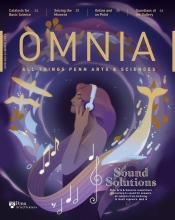An Economist’s Take on Illicit Drug Use
Research from Artem Kuriksha, GR’24, found that people will substitute one drug for another, but only in specific ways.

When Artem Kuriksha, GR’24, returned home to Russia a few years ago for a visit, he noticed something odd during walks in the park. People would often be looking for something behind the trees.
His friend explained: These were drop points for a drug marketplace on the dark web called Hydra. Though such dealing had become a major social phenomenon in Russia, the unusual behavior in the park was the first time Kuriksha, who earned a Ph.D. in economics, had himself witnessed Hydra’s presence.
He thought the phenomenon could be important to study, “an opportunity to look into the behavior of drug consumers,” he says. Kuriksha and Penn Ph.D. classmate Priyanka Goonetilleke, GR’24, Princeton University Ph.D. candidate Anastasia Karpova, and Peter Meylakhs of Sechenov University in Moscow, began scraping data from Hydra.
“When we started digging in, we didn’t know where this would go,” Kuriksha says. “We wanted to understand the price variation, how prices change over time, how sellers differ, how competitive this market is.” They plotted the distribution of drugs in different neighborhoods and examined user reviews of drug transactions to observe how people switch between different drugs. Analyzing their data, they found that people will substitute one drug for another—but in particular ways.
The biggest takeaway was cannabis, according to Kuriksha: Legalizing it has the potential to limit consumption of other drugs. For instance, if cannabis becomes more accessible, for every four additional doses of cannabis consumed, one fewer dose of another drug is consumed. Introducing new synthetic drugs, on the other hand, raises overall demand by 40 percent—people don’t just substitute from pre-existing drugs but actually increase total drug consumption.
Finally, the team also found that certain drugs like heroin and cocaine have few substitutes. Kuriksha says prioritizing drugs like these for attention by law enforcement may be the best way to decrease total harm from drugs.
Having this information can be “very useful for policymakers,” he adds. “Substitution can be a crucial tool, but you need to account for how exactly drug users substitute. This research is a unique opportunity to actually see what people are doing; because we understand so little about what happens in the U.S. and Europe around drug use, we should try to use knowledge from the Russian data to make decisions.”
Click here to see a presentation by Kuriksha on this work.



